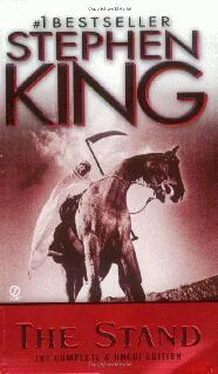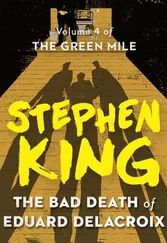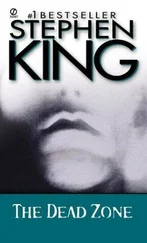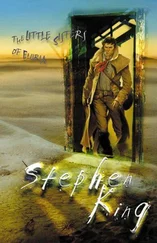Frannie cleared her throat a little. “Need a hand?”
He turned and grinned. “Hello, Fran. Caught me diggin, didn’t you?”
“I guess I did.”
“Is your mother back yet?” He frowned vaguely, and then his face cleared. “No, that’s right, she just went, didn’t she. Sure, pitch a hand if you want to. Just don’t forget to wash up afterward.”
“A lady’s hands proclaim her habits,” Fran mocked lightly and snorted. Peter tried to look disapproving and did a poor job of it.
She got down in the row next to him and began to weed. Sparrows were twittering and there was a constant hum of traffic on US 1, less than a block from here. It hadn’t reached the volume it would in July, when there would be a fatal accident nearly every day between here and Kittery, but it was building.
Peter told her about his day and she responded with the right questions, nodding in places. Intent on his work, he wouldn’t see her nods, but the corner of his eye would catch her shadow nodding. He was a machinist in a large Sanford auto parts firm, the largest auto firm north of Boston. He was sixty-four and about to start on his last year of work before retirement. A short year at that, because he had four weeks’ vacation time stockpiled, which he planned to take in September, after the “ijits” went home. The retirement was much on his mind. He was trying not to look at it as a never-ending vacation, he told her; he had enough friends in retirement now who had brought back the news that it wasn’t like that at all. He didn’t think he would be as bored as Harlan Enders or as shamefully poor as the Carom—there was poor Paul, hardly ever missed a day at the shop in his life, and yet he and his wife had been forced to sell their house and move in with their daughter and her husband.
Peter Goldsmith hadn’t been content with Social Security; he had never trusted it, even in the days before the system began to break down under recession, inflation, and the steadily increasing number of people on the books. There hadn’t been many Democrats in Maine during the thirties and forties, he told his listening daughter, but her grandfather had been one, and her grandfather had by-God made one out of her father. In Ogunquit’s palmiest days, that had made the Goldsmiths pariahs of a kind. But his father had had one saying as rock-ribbed as the stoniest Maine Republican’s philosophy: Put not your trust in the princes of this world, for they will frig thee up and so shalt their governments, even unto the end of the earth.
Frannie laughed. She loved it when her dad talked this way. It wasn’t a way he talked often, because the woman that was his wife and her mother would (and had) all but cut the tongue out of his head with the acid which could flow so quickly and freely from her own.
You had to trust yourself, he continued, and let the princes of this world get along as best they could with the people who had elected them. Most times that wasn’t very well, but that was okay; they deserved each other.
“Hard cash is the answer,” he told Frannie. “Will Rogers said it was land, because that’s the only thing they’re not making any more of, but the same goes for gold and silver. A man who loves money is a bastard, someone to be hated. A man who can’t take care of it is a fool. You don’t hate him, but you got to pity him.”
Fran wondered if he was thinking of poor Paul Caron, who had been his friend since before Fran herself was born, and decided not to ask.
At any rate, she didn’t need him to tell her that he had socked away enough in the good years to keep them rolling. What he did tell her was that she had never been a burden to them, in good times or in bad, and he was proud to tell his friends he had sent her through school. What his money and her brains hadn’t been able to take care of, he told them, she had done the old-fashioned way: by bending her back and shucking her buns. Working, and working hard, if you wanted to cut through the country bullshit. Her mother didn’t always understand that. Changes had come for women, whether the women always liked them or not, and it was hard for Carla to get it through her head that Fran wasn’t down there at UNH husband-hunting.
“She sees Amy Lauder getting married,” Peter said, “and she thinks, ‘That should be my Fran. Amy’s pretty, but when you put my Fran beside her, Amy Lauder looks like an old dish with a crack in it.’ Your mother has been using the old yardsticks all her life, and she can’t change now. So if you n her scrape together a bit and make some sparks from time to time, like steel against flint, that’s why. No one is to blame. But you have to remember, Fran, she’s too old to change, but you are getting old enough to understand that.”
From this he rambled back to his job again, telling her about how one of his co-workers had almost lost his thumb in a small press because his mind was down at the pool-hall while his damn thumb was under the stamp. Good thing Lester Crowley had pulled him away in time. But, he added, someday Lester Crowley wouldn’t be there. He sighed, as if remembering he wouldn’t be either, then brightened and began telling her about an idea he’d had for a car antenna concealed in the hood ornament.
His voice switched from topic to topic, mellow and soothing. Their shadows grew longer, moving up the rows before them. She was lulled by it, as she always had been. She had come here to tell something, but since earliest childhood she had often come to tell and stayed to listen. He didn’t bore her. So far as she knew, he didn’t bore anyone, except possibly her mother. He was a storyteller, and a good one.
She became aware that he had stopped talking. He was sitting on a rock at the end of his row, tamping his pipe and looking at her.
“What’s on your mind, Frannie?”
She looked at him dumbly for a moment, not sure how she should proceed. She had come out here to tell him, and now she wasn’t sure if she could. The silence hung between them, growing larger, and at last it was a gulf she couldn’t stand. She jumped.
“I’m pregnant,” she said simply.
He stopped filling his pipe and just looked at her. “Pregnant,” he said, as if he had never heard the word before. Then he said: “Oh, Frannie… is it a joke? Or a game?”
“No, Daddy.”
“You better come over here and sit with me.”
Obediently, she came up the row and sat next to him. There was a rock wall that divided their land from the town common next door. Beyond the rock wall was a tangled, sweet-smelling hedge that had long ago run wild in the most amiable way. Her head was pounding and she felt a little sick to her stomach.
“For sure?” he asked her.
“For sure,” she said, and then—there was no artifice in it, not a trace, she simply couldn’t help it—she began to cry in great, braying sobs. He held her with one arm for what seemed to be a very long time. When her tears began to taper off, she forced herself to ask the question that troubled her the most.
“Daddy, do you still like me?”
“What?” He looked at her, puzzled. “Yes. I still like you fine, Frannie.”
That made her cry again, but this time he let her tend herself while he got his pipe going. Borkum Riff began to ride slowly off on the faint breeze.
“Are you disappointed?” she asked.
“I don’t know. I never had a pregnant daughter before and am not sure just how I should take it. Was it that Jess?”
She nodded.
“You told him?”
She nodded again.
“What did he say?”
“He said he would marry me. Or pay for an abortion.”
“Marriage or abortion,” Peter Goldsmith said, and drew on his pipe. “He’s a regular two-gun Sam.”
She looked down at her hands, splayed on her jeans. There was dirt in the small creases of the knuckles and dirt under the nails. A lady’s hands proclaim her habits, the mental mother spoke up. A pregnant daughter. I’ll have to resign my membership in the church. A lady’s hands—
Читать дальше












